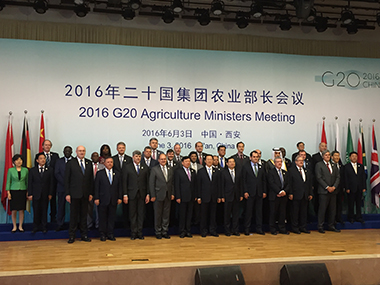The following story was orginally published on the IFPRI-led Food Security Portal.
The G20 Agriculture Ministers met in Xi’an on June 3 to discuss the ways in which the members can promote food security, nutrition, sustainable agricultural growth and rural development worldwide. In the communique, the ministers noted an increased commitment to the Sustainable Development goals (SDGs). In particular, they noted that agriculture and rural development are critical for global food security and poverty alleviation and that coordination across political boundaries will be needed to meet the complex challenges including climate change.
The communique notes that the members can play a leading role in coordination of efforts and support development of national food security strategies to improve effectiveness and efficiency. This could include institutional innovation to allow more inclusive financial systems as well as additional economic opportunities in rural areas. The ministers also express a continued commitment to address food price volatility through dedicated forums as well as a continued commitment to COP 21 and implementation of the Intended Nationally Determined Contributions.
The ministers note the importance of agricultural research and development (R&D) for sustainable agricultural growth and support for efforts in R&D innovation by groups such as the CGIAR. The members are encouraged to use open data initiatives and take advantage of learning networks. The ministers call for a special focus on developing countries where food security governance systems should be supported through relevant technologies and South-South cooperation. The exchange of experiences and best practices on use of technologies will be critical to sustainable agriculture development in many developing countries. The communique notes the importance of innovative options for both agriculture development and policy frameworks to create more efficient and inclusive food value chains.
The ministers support the application of Information and Communications Technology (ICT) in agriculture noting its potential to allow better integration and efficiency gains in the food system. The communique discusses the ability of ICT to improve exchange and cooperation and calls for FAO, IFPRI and OECD to build upon their existing ICT applications and platforms and propose action plans to be taken forward by G20 Agriculture Deputies before the next meeting. IFPRI has done extensive analysis on the use and potential of ICTs in agriculture and has found that both connectivity and content need to progress simultaneously to witness positive gains, requiring sustained investment by both the public and private sector. IFPRI has also conducted an assessment of the effects of ICTs on agriculture development allowing specific recommendations for future ICT proposals; the platform will build upon this assessment.
To conclude, the communique stresses the importance of sound agricultural policies, investment and trade for sustainable development, food security and poverty reduction. The ministers call for greater agricultural investment by governments and the private sector as well as increased investment in agriculture infrastructure, research and extension, water and land management, and capacity development.







